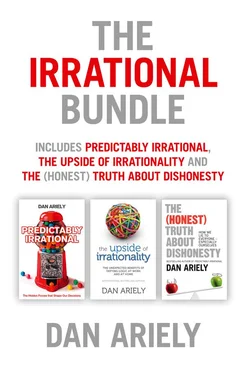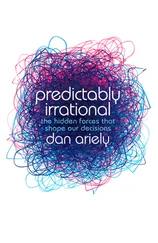A third set of questions asked about Roy’s likelihood of engaging in behaviors related to unsafe sex. Does a condom decrease sexual pleasure? Would he always use a condom if he didn’t know the sexual history of a new sexual partner? Would he use a condom even if he was afraid that a woman might change her mind while he went to get it? * Конец ознакомительного фрагмента. Текст предоставлен ООО «ЛитРес». Прочитайте эту книгу целиком, купив полную легальную версию на ЛитРес. Безопасно оплатить книгу можно банковской картой Visa, MasterCard, Maestro, со счета мобильного телефона, с платежного терминала, в салоне МТС или Связной, через PayPal, WebMoney, Яндекс.Деньги, QIWI Кошелек, бонусными картами или другим удобным Вам способом.
A few days later, having answered the questions in his “cold,” rational state, Roy met again with Mike.
“Those were some interesting questions,” Roy noted.
“Yes, I know,” Mike said coolly. “Kinsey had nothing on us. By the way, we have another set of experimental sessions. Would you be interested in participating again?”
Roy smiled a little, shrugged, and nodded.
Mike shoved a few pages toward him. “This time we’re asking you to sign the same consent form, but the next task will be slightly different. The next session will be very much the same as the last one, but this time we want you to get yourself into an excited state by viewing a set of arousing pictures and masturbating. What we want you to do is arouse yourself to a high level, but not to ejaculate. In case you do, though, the computer will be protected.”
Mike pulled out the Apple iBook. This time the keyboard and the screen were covered with a thin layer of Saran wrap.
Roy made a face. “I didn’t know computers could get pregnant.”
“Not a chance,” Mike laughed. “This one had its tubes tied. But we like to keep them clean.”
Mike explained that Roy would browse through a series of erotic pictures on the computer to help him get to the right level of arousal; then he would answer the same questions as before.
WITHIN THREE MONTHS, some fine Berkeley undergraduate students had undergone a variety of sessions in different orders. In the set of sessions conducted when they were in a cold, dispassionate state, they predicted what their sexual and moral decisions would be if they were aroused. In the set of sessions conducted when they were in a hot, aroused state, they also predicted their decisions—but this time, since they were actually in the grip of passion, they were presumably more aware of their preferences in that state. When the study was completed, the conclusions were consistent and clear—overwhelmingly clear, frighteningly clear.
In every case, our bright young participants answered the questions very differently when they were aroused from when they were in a “cold” state. Across the 19 questions about sexual preferences, when Roy and all the other participants were aroused they predicted that their desire to engage in a variety of somewhat odd sexual activities would be nearly twice as high as (72 percent higher than) they had predicted when they were cold. For example, the idea of enjoying contact with animals was more than twice as appealing when they were in a state of arousal as when they were in a cold state. In the five questions about their propensity to engage in immoral activities, when they were aroused they predicted their propensity to be more than twice as high as (136 percent higher than) they had predicted in the cold state. Similarly, in the set of questions about using condoms, and despite the warnings that had been hammered into them over the years about the importance of condoms, they were 25 percent more likely in the aroused state than in the cold state to predict that they would forego condoms. In all these cases they failed to predict the influence of arousal on their sexual preferences, morality, and approach to safe sex.
The results showed that when Roy and the other participants were in a cold, rational, superego-driven state, they respected women; they were not particularly attracted to the odd sexual activities we asked them about; they always took the moral high ground; and they expected that they would always use a condom. They thought that they understood themselves, their preferences, and what actions they were capable of. But as it turned out, they completely underestimated their reactions.
No matter how we looked at the numbers, it was clear that the magnitude of underprediction by the participants was substantial. Across the board, they revealed in their unaroused state that they themselves did not know what they were like once aroused. Prevention, protection, conservatism, and morality disappeared completely from the radar screen. They were simply unable to predict the degree to which passion would change them. * Конец ознакомительного фрагмента. Текст предоставлен ООО «ЛитРес». Прочитайте эту книгу целиком, купив полную легальную версию на ЛитРес. Безопасно оплатить книгу можно банковской картой Visa, MasterCard, Maestro, со счета мобильного телефона, с платежного терминала, в салоне МТС или Связной, через PayPal, WebMoney, Яндекс.Деньги, QIWI Кошелек, бонусными картами или другим удобным Вам способом.
IMAGINE WAKING UP one morning, looking in the mirror, and discovering that someone else—something alien but human—has taken over your body. You’re uglier, shorter, hairier; your lips are thinner, your incisors are longer, your nails are filthy, your face is flatter. Two cold, reptilian eyes gaze back at you. You long to smash something, rape someone. You are not you. You are a monster.
Beset by this nightmarish vision, Robert Louis Stevenson screamed in his sleep in the early hours of an autumn morning in 1885. Immediately after his wife awoke him, he set to work on what he called a “fine bogey tale”—Dr. Jekyll and Mr. Hyde—in which he said, “Man is not truly one, but truly two.” The book was an overnight success, and no wonder. The story captivated the imagination of Victorians, who were fascinated with the dichotomy between repressive propriety—represented by the mild-mannered scientist Dr. Jekyll—and uncontrollable passion, embodied in the murderous Mr. Hyde. Dr. Jekyll thought he understood how to control himself. But when Mr. Hyde took over, look out.
The story was frightening and imaginative, but it wasn’t new. Long before Sophocles’s Oedipus Rex and Shakespeare’s Macbeth, the war between interior good and evil had been the stuff of myth, religion, and literature. In Freudian terms, each of us houses a dark self, an id, a brute that can unpredictably wrest control away from the superego. Thus a pleasant, friendly neighbor, seized by road rage, crashes his car into a semi. A teenager grabs a gun and shoots his friends. A priest rapes a boy. All these otherwise good people assume that they understand themselves. But in the heat of passion, suddenly, with the flip of some interior switch, everything changes.
Our experiment at Berkeley revealed not just the old story that we are all like Jekyll and Hyde, but also something new—that every one of us, regardless of how “good” we are, underpredicts the effect of passion on our behavior. In every case, the participants in our experiment got it wrong. Even the most brilliant and rational person, in the heat of passion, seems to be absolutely and completely divorced from the person he thought he was. Moreover, it is not just that people make wrong predictions about themselves—their predictions are wrong by a large margin.
Читать дальше












